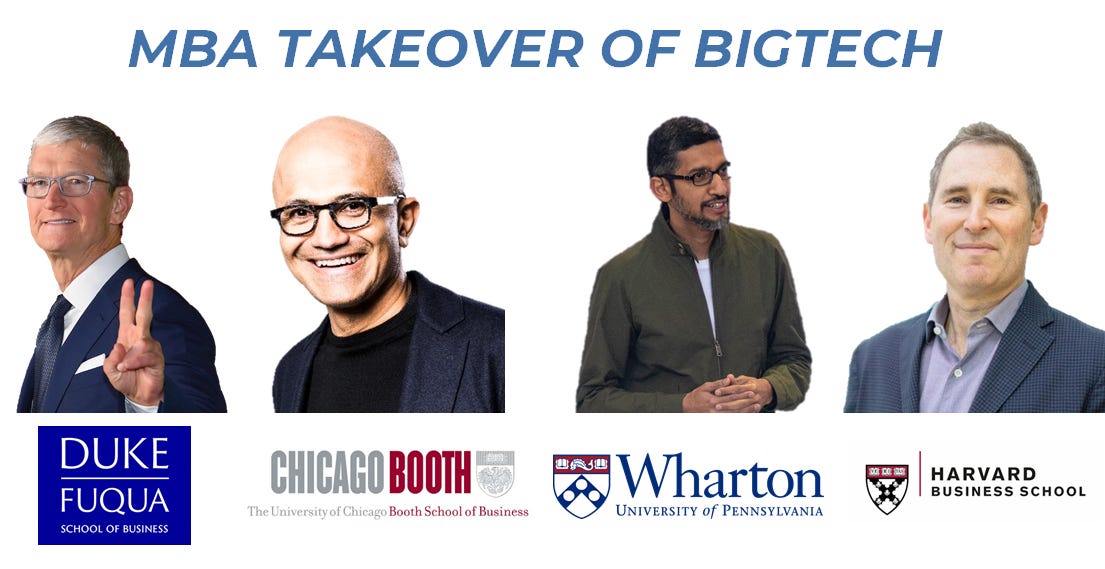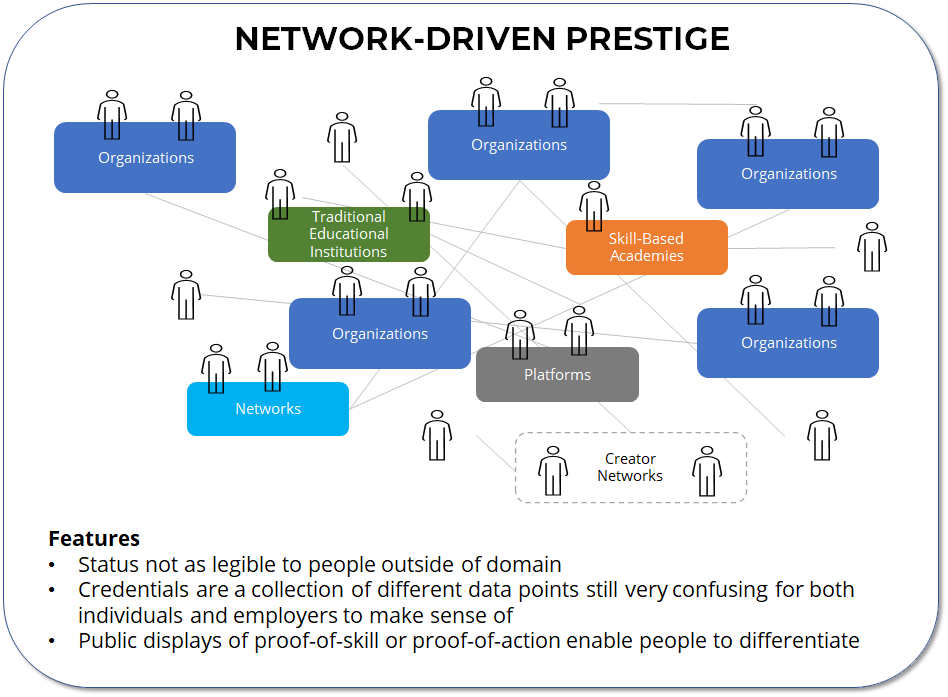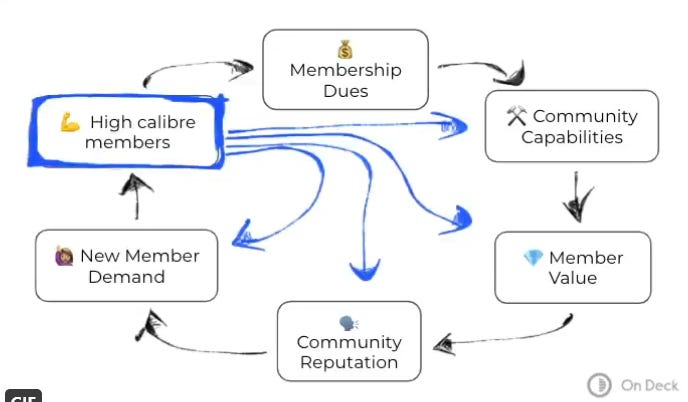January 23rd, 2021: Greetings from Taipei. We are in day two of a mandatory house arrest / quarantine but in 12 days we will be able to emerge into a nearly covid-free country. We are planning on staying here indefinitely until we get a better sense of the vaccine and travel situation.
👋 Greetings to the nearly 200 new subscribers from last week. I love hearing from people so hit reply and let me know what’s on your mind. If you missed my newsletter last week, I wrote about why I was writing a book. (EDIT: I shipped the book - it’s called The Pathless Path and you can learn more here)
If you stumbled upon this from the web, sign up here to get the best free newsletter on navigating the pathless path and making sense of the modern weirdness of work.
#1 Network Legibility & Status
I want to explore the changing dynamics of how people earn prestige, the new dynamics of credentials and status, and what this might mean for how people navigate work and their careers in the future.
I am going to look at this through the lens of the full-time MBA, something I did from 2010 to 2012, but increasingly irrelevant and overpriced in today’s world.
What is the “job” of the Full-time MBA?
I’m a fan of the “jobs to be done” framework. It looks at the job that a service or product is performing. It’s not a useful frame to argue whether or not a business school is worth it. Instead it’s more useful to see what jobs the service performs and if there are better ways to pay for those jobs.
There have been a lot of arguments over why people get MBAs and what people are paying for. In my own experience and upon reflection, I think the MBA gives people three core things:
Confidence: Being in a positive, ambitious, and friendly environment that will help you overcome the everyday friction and self-doubt that most people face when trying to achieve anything, leading to an increase in confidence.
Hidden Codes: Learning some of the hard to understand behaviors, norms, calculations, frameworks, and styles of communication that enable one to aim towards large goals without getting laughed at by the established leaders in these spaces
High-Paying Jobs: Access to a number of high-paying jobs across a wide range of industries and functions that hire a new crop of MBA graduates every year and know the unique demands of this group of graduates
This system works extremely well, I think, because of the incredibly tight link between MBA programs and the companies that hire from those schools. The schools need a steady number of openings of jobs that pay six-figures and offer interesting problems and potential career paths. The companies need a steady crop of middle to senior managers that all behave in predictable ways and might produce future executives.
The secret force keeping this together is a large group of alumni at these companies. They want to keep hiring the students from their schools because it helps them stay connected to a University (often a source of nostalgia and memories of youth) and gives them a source of prestige within their company, especially if they discover a “rising star.”
Wildly Expensive, But Still (Mostly) Working, For Now
This state of affairs has been operating quite smoothly and without much competition for 50+ years. As the industrial economy has grown and globalization and financialization have created more attractive post-MBA career paths with 6-figure jobs, the MBA programs have been able to expand and raise tuition.
It’s also notable that the MBA has steadily infiltrated the tech industry despite the popular meme that MBAs don’t know how to run businesses. Currently the top four biggest tech companies all have MBA CEOs: Cook (Fuqua), Pinchai (Wharton), Nadella (Booth), and soon, by the end of the year, Jassy (HBS).
I graduated in 2012 and over the last eight years, I’ve seen a steady flow of my classmates from more traditional industrial-era companies to BigTech. If there is one other thing you learn at business school, it’s where you can make the most money working a full-time job.
Despite full-time MBAs costing more than $75,000 per year just in tuition one can still make a pretty good argument that these programs are worth it, especially if you are confident you want to work in the types of jobs these schools have access to. The median salaries of HBS grads is almost $150,00 and if you know anything about BigTech or Finance salaries, its quite easy once you’re in these worlds to find a job making almost a quarter million dollars a year within five years after grad school.
Networks are credential-making machines
Despite many people thinking the technology industry would make the MBA irrelevant, it strengthened it. However, the technologies and social networks it produced are enabling a new way for the worker to engage and own their own career in ways we haven’t really seen at scale. I predict that 2020 be seen as a major inflection point for many full-time MBA programs.
Consider that when I graduated college in 2007 almost no one used LinkedIn and my only source of potential connections was through my school’s alumni database or the connections of people I knew.
Thirteen years later the ambitious young person is part of many different networks. When I lived in New York I was part of many different communities:
An informal group of people interested in organization change I met through my writing online
Virtual and in-person events led by companies like Culture Amp, Live in The Grey and other startups on wide ranges of topics
A group called IVY which held events for young professionals but kind of operated as a way to meet potential significant others
A volunteer group with 100 other young professionals as part of a two-year program I was part of
Alumni networks of two companies I worked for
Two alumni groups for my schools
Now, as a citizen of gig world, I am part of many more networks. In a world where connecting with others based on interests, skills, and passion is easier than ever, connecting based on a common degree feels stale. Hence why I rarely open emails from my schools. They are stuck in a world based on credential and endowment size rather than having an understanding that in an opt-in world, where you devote your energy is a signal to others about what matters to you.
Schools are going to have a hard time adjusting to a world in which anyone in the world can now earn prestige from their desk. Some examples:
Launching a startup and joining incubators around the world
taking an online course with an engaging community
attend conferences and meetups in your field
Writing or sharing content publicly in your expertise
Hosting or participating in online meetups
Engage with people in your industry on Twitter and share interesting ideas
Attending online schools like Lambda Academy
Schools are certainly still in the mix but for many people, it’s becoming a much smarter bet to at least test out one of these alternative pathways before spending months studying for exams and dropping 5 or 6 figures for a credential.
That’s not to say this is easy to understand. This new dynamic of network-driven prestige is messy and often illegible to people who have not engaged with it.
Older people will often say things to me like “you can do what you do because you went to MIT.” They are still operating in the hierarchical prestige view of the world. Success is a result of having earned the right credentials.
They are often surprised when I share that I landed a writing gig on Twitter after sharing an essay I wrote on a similar topic or that hired me as a presentaiton coach after watching my YouTube video.
My essay and video were both proof-of-skill. They were able to exactly the person they needed. For good or bad, this type of dynamic is coming to every part of the economy which is going to put tremendous pressure on high-priced credential-awarding institutions but it also offers a tremendous advantage for the individuals and employers that learn to operate in a new way.
The Better Options Are Emerging
One of the reasons the MBA has remained relevant is that better options have not emerged.
Consider my friend who has felt stuck in his career for four or five years. He’s been successful but doesn’t really like what he is doing and has wanted to experiment with working on startups. He’s not a natural at reinventing himself and has been talking about doing a full-time MBA as the way to make that shift.
Top MBA programs are mostly driven people that aren’t sure what they want to do but are sure that they want to be successful.
I’ve coached many people like him over the years and 100% of them end up going to business school. Yet last week he texted me that he had decided to do the On Deck Fellowship. For $2,500 he’ll join a 10-week program focused on helping people transitioning to launching a startup or at least working in that space.
He’s saving $147,000, two years of salary loss, and is likely going to get many of the benefits that the MBA would given him, especially the confidence and hidden codes mentioned above.
As these better options emerge people are starting to realize that paying an insane amount of money for a grad degree is quite a dramatic way to make a career change.


On Deck is creating the space for strong connections to form and making the bet that people don’t need to hang out at a University Campus for another 94 weeks to continue to develop those bonds, find their own opportunities and learn the skills they need to follow their path.
The driven young person is used to already accessing all sorts of apps, communities, networks, and services and as higher education becomes unbundled there will be countless new paths that emerge.
On deck is betting “finding the others” is a bigger problem to be solved rather than getting access to high-prestige jobs. If people can find the others and start working on what they want to be working on, especially the kind of people already doing that, the jobs and opportunities will come.
They even share their playbook:
Not that schools are going to do anything about it.
#2 The Way We Work (h/t Nick Bea & Jackson Clemmer)
A few people forwarded this essay “What’s Wrong With The Way We Work?” from the New Yorker this week. It raises the question “why do we still all work so much and why do some people need to work multiple jobs to pay their bills?”
It offers a brief snapshot of the history of work but its answer to the question, CEO pay, doesn’t seem to me to be all that big of a driver. A convenient scapegoat maybe but not the reason our relationship with work is so fraught.
I think a far more compelling answer to the previous question has to do with religion. A reader pointed me to the religious-oriented writings of Andy Crouch and David Zahl who argue that we have repurposed our religiouse impulses towards a secular world. Here is Zahl:
The point here–and I can feel myself yawning inside as I write this–is not that work is bad, or careerism is necessarily dehumanizing. The point is simply that religious observance hasn’t faded apace “secularization” so much as migrated—and we’ve got the anxiety to prove it. We are seldom not in church, often many different ones at the same time (St Elon’s of Perpetual Productivity, Apostle Maguire’s Soulmate Chapel, First Station of the CrossFit, etc.). Of course, never-ending church attendance is only a problem to the extent that the ‘gospel’ on offer at all of these rings such a similar note of, well, law. Blessed Are Those Who Perform (So Perform, Dammit!).
Here is Crouch sharing a similar sentiment sentiment about Steve Jobs in 2011, arguing that Jobs was the epitome of the “gospel of the secular age” which he defines:
It has the great virtue of being based only on what we can all perceive—it requires neither revelation nor dogma. And it promises nothing it cannot deliver—since all that is promised is the opportunity to live your own unique life, a hope that is manifestly realizable since it is offered by one who has so spectacularly succeeded by following his own "inner voice, heart and intuition."
To Zahl, “what we’re actually worshiping when we obsess over food or work or politics is not the thing itself but how that thing makes us feel.”
So in our relationship with work we are combining a religious impulse with the modern idea that we should be happy and be true to ourselves. This is a ton of pressure and its no surprise that so many people seem to be burned out and frustrated.
#3 McLuhan Interview (h/t David Perell)
This interview in Playboy (SFW) from Marshall McLuhan was jaw-dropping in how many predictions about the future he seemed to get right. Consider this passage and 95% might still apply today
Yes, and to the booming business psychiatrists are doing. All our alienation and atomization are reflected in the crumbling of such time-honored social values as the right of privacy and the sanctity of the individual; as they yield to the intensities of the new technology's electric circus, it seems to the average citizen that the sky is falling in. As man is tribally metamorphosed by the electric media, we all become Chicken Littles, scurrying around frantically in search of our former identities, and in the process unleash tremendous violence. As the preliterate confronts the literate in the postliterate arena, as new information patterns inundate and uproot the old, mental breakdowns of varying degrees – including the collective nervous breakdowns of whole societies unable to resolve their crises of identity – will become very common.
It is not an easy period in which to live, especially for the television-conditioned young who, unlike their literate elders, cannot take refuge in the zombie trance of Narcissus narcosis that numbs the state of psychic shock induced by the impact of the new media. From Tokyo to Paris to Columbia, youth mindlessly acts out its identity quest in the theater of the streets, searching not for goals but for roles, striving for an identity that eludes them.
Do read the whole thing if you are interested in culture, media, and technology.
Thanks for reading this week’s issue. If you’d like to support my journey and help keep nudging me to write this newsletter you can consider becoming an ongoing patron by becoming a paid subscriber or if you’d like just share a nice tweet on Twitter.











🔥🔥🔥